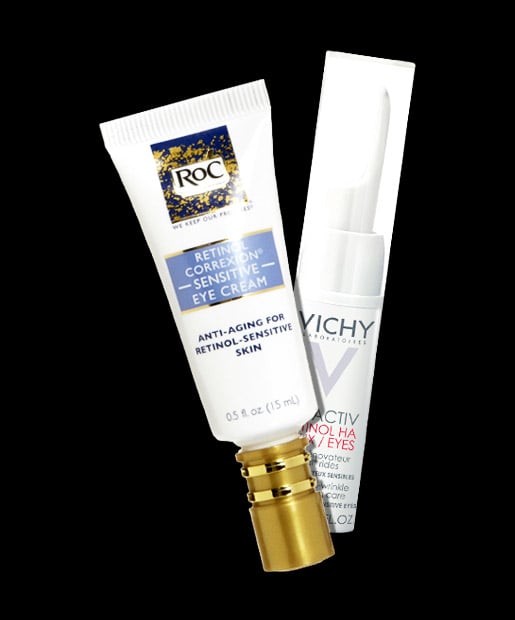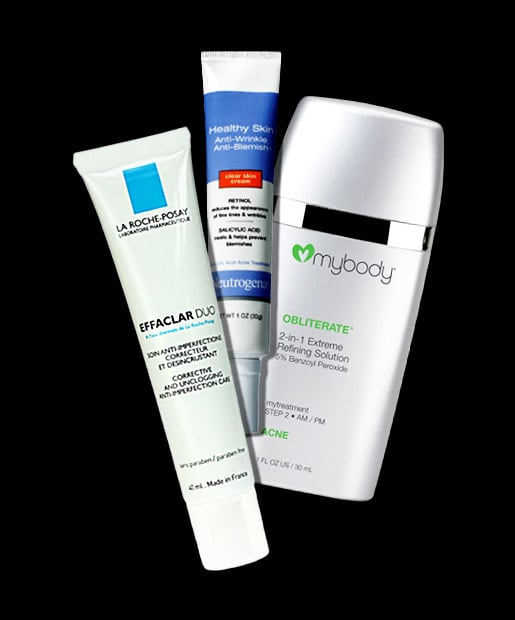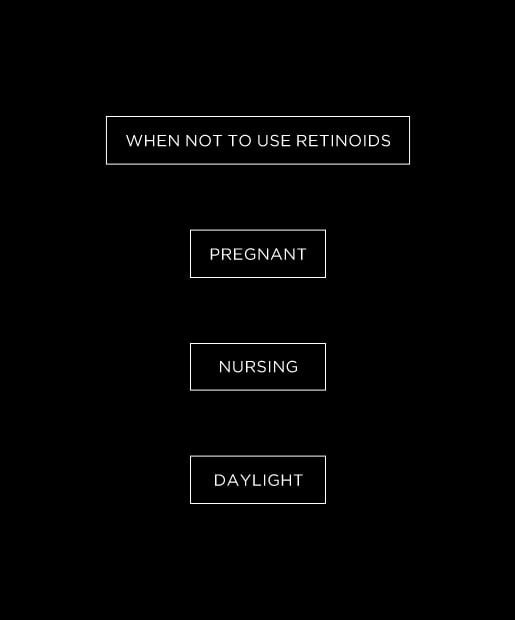If your skin is extremely sensitive (or — like me — you're scared of the flaky, red skin that goes hand in hand with retinoic acid), start with the gentlest form of retinol: retinyl palmitate. "You'll see less improvement in terms of fine lines, wrinkles, collagen production and blotchiness, but that doesn't mean it's insignificant," says Prytowsky.
Retinol derivatives can be applied all over (try Olay Regenerist Advanced Anti-Aging Intensive Repair Treatment, $25.99), but they are especially useful for the fragile skin around the eyes, and many brands have formulated eye creams containing them. Try RoC Retinol Correxion Sensitive Eye Cream, $22.99, or Vichy LiftActiv Retinol HA Eyes, $42.50.
Retinol derivatives can be applied all over (try Olay Regenerist Advanced Anti-Aging Intensive Repair Treatment, $25.99), but they are especially useful for the fragile skin around the eyes, and many brands have formulated eye creams containing them. Try RoC Retinol Correxion Sensitive Eye Cream, $22.99, or Vichy LiftActiv Retinol HA Eyes, $42.50.
Retinoids aren't only wrinkle fighters — they also treat acne. In fact, when the ingredient was first approved by the FDA in 1971, it was intended for acne patients. But like bell bottoms and disco, these original creams are now passé.
In lieu of prescription-strength retinoids, many dermatologists take a multi-faceted approach to treating breakouts. They recommend products that combine retinol with anti-acne ingredients like salicylic acid. "The combination is great because the retinol will start to loosen the skin cells that line the follicles," says Prystowsky. "The oil that's accumulating inside the pores can push to the surface." Meanwhile, benzoyl peroxide kills bacteria and salicylic acid exfoliates the top layer of skin. Basically, you're breaking the breakout cycle in two places.
Fair warning: don't play chemist and mix two products containing these ingredients yourself unless your doctor gives you the green light. Instead, look for one product that contains two ingredients — they've been formulated to work together. We like Neutrogena Healthy Skin Anti-Wrinkle Anti-Blemish Cream, $13.99, and LaRoche Posay Effaclar K Clarifying Moisturizer, $30.99 — both have a blend of a retinol derivative and salicylic acid — and MyBody Obliterate 2-in1 Extreme Refining Solution, $90, with benzoyl peroxide and a retinol complex.
In lieu of prescription-strength retinoids, many dermatologists take a multi-faceted approach to treating breakouts. They recommend products that combine retinol with anti-acne ingredients like salicylic acid. "The combination is great because the retinol will start to loosen the skin cells that line the follicles," says Prystowsky. "The oil that's accumulating inside the pores can push to the surface." Meanwhile, benzoyl peroxide kills bacteria and salicylic acid exfoliates the top layer of skin. Basically, you're breaking the breakout cycle in two places.
Fair warning: don't play chemist and mix two products containing these ingredients yourself unless your doctor gives you the green light. Instead, look for one product that contains two ingredients — they've been formulated to work together. We like Neutrogena Healthy Skin Anti-Wrinkle Anti-Blemish Cream, $13.99, and LaRoche Posay Effaclar K Clarifying Moisturizer, $30.99 — both have a blend of a retinol derivative and salicylic acid — and MyBody Obliterate 2-in1 Extreme Refining Solution, $90, with benzoyl peroxide and a retinol complex.
It would be misleading for us to go on and on about the benefits of retinol without a few words of caution. Pregnant and nursing women shouldn't use them. (Some studies have shown a possible correlation between topical vitamin A and birth defects.)
And if your skin is sensitive to the sun, a retinoid will make you flare up even faster. Be sure to pile on the SPF, wear a hat and stay in the shade. Unless you choose a retinol that's specifically formulated for daytime use, its best to use them at night. "Nighttime use is better because the products are photosensitive," explains Prytowsky. "The chemical will degrade when it's exposed to natural sunlight, and it could degrade before it has a chance to absorb into your skin."
If you're doing everything right, don't use dry, irritated skin as an excuse to toss your retinol — that just means it's working. It may take several weeks, but you'll eventually build up a tolerance. It's an annoying process, but smoother, younger-looking skin awaits you on the other side.
And if your skin is sensitive to the sun, a retinoid will make you flare up even faster. Be sure to pile on the SPF, wear a hat and stay in the shade. Unless you choose a retinol that's specifically formulated for daytime use, its best to use them at night. "Nighttime use is better because the products are photosensitive," explains Prytowsky. "The chemical will degrade when it's exposed to natural sunlight, and it could degrade before it has a chance to absorb into your skin."
If you're doing everything right, don't use dry, irritated skin as an excuse to toss your retinol — that just means it's working. It may take several weeks, but you'll eventually build up a tolerance. It's an annoying process, but smoother, younger-looking skin awaits you on the other side.






